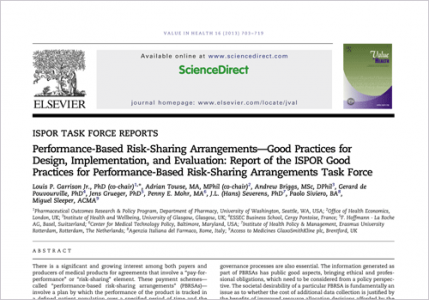Sign up to our newsletter Subscribe
Analysing Global Immunisation Expenditure

Sign up to our newsletter Subscribe


Best practices for performance-based risk-sharing arrangements in health care are described in detail in this new ISPOR report, developed by a task force co-chaired by Professor Lou Garrison, University of Washington and Visiting Senior Research Fellow at the OHE, and…

Best practices for performance-based risk-sharing arrangements in health care are described in detail in this new ISPOR report, developed by a task force co-chaired by Professor Lou Garrison, University of Washington and Visiting Senior Research Fellow at the OHE, and Professor Adrian Towse, Director of the OHE. The report appeared in late August in Value in Health. The idea of paying only for health interventions that work at least as well as expected is intuitively attractive.
Best practices for performance-based risk-sharing arrangements in health care are described in detail in this new ISPOR[1] report, developed by a task force co-chaired by Professor Lou Garrison, University of Washington and Visiting Senior Research Fellow at the OHE, and Professor Adrian Towse, Director of the OHE[2]. The report appeared in late August in Value in Health.
The idea of paying only for health interventions that work at least as well as expected is intuitively attractive. Called “performance-based risk-sharing arrangements” (PBRSAs), these payment schemes “involve a plan by which the performance of the product is tracked in a defined patient population over a specified period of time and the amount or level of reimbursement is based on the health and cost outcomes achieved”. In part, PBSRAs are meant to address the growing recognition that ultimate real-world clinical and economic performance of a new product is uncertain when the product first reaches the market.
The objective of the report is to “set out the standards that should be applied to 'good practices'—both research and operational—in the use of a PBRSA, encompassing questions around the desirability, design, implementation, and evaluation of such an arrangement”. It thoroughly describes the various types of PBSRAs now in use, or in discussion, and offers practical recommendations for developing, assessing and implementing such schemes.
Key findings include the following:
[2] The other members of the Task Force who contributed to the report are: Andrew Briggs, University of Glasgow; Gerard de Pouvourville, ESSEC Business School, France; Jens Grueger, F. Hoffmann-La Roche; Penny Mohr, Center for Medical Technology Policy, USA; J.L. Severens, Erasmus University Rotterdam; Paolo Siviero, AIFA (Italian Medicines Agency); and Miguel Sleeper, GlaxoSmithKline.
For a recent slide presentation by Prof Towse that discusses PBSRAs, please click here.
An error has occurred, please try again later.
This website uses cookies so that we can provide you with the best user experience possible. Cookie information is stored in your browser and performs functions such as recognising you when you return to our website and helping our team to understand which sections of the website you find most interesting and useful.
Strictly Necessary Cookie should be enabled at all times so that we can save your preferences for cookie settings.
If you disable this cookie, we will not be able to save your preferences. This means that every time you visit this website you will need to enable or disable cookies again.
This website uses Google Analytics to collect anonymous information such as the number of visitors to the site, and the most popular pages.
Keeping this cookie enabled helps us to improve our website.
Please enable Strictly Necessary Cookies first so that we can save your preferences!
